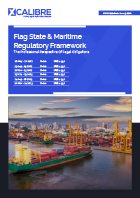| Date | Venue | Fee | |
|---|---|---|---|
| 11 May - 15 May 2026 | Dubai – UAE | $ 5,950 | Register Now |
| 10 Aug - 14 Aug 2026 | Dubai – UAE | $ 5,950 | Register Now |
| 16 Nov - 20 Nov 2026 | Dubai – UAE | $ 5,950 | Register Now |
About the Course
This Flag State & Maritime Regulatory Framework training course explains in detail the responsibilities of flag states within international regulatory frameworks, i.e. international maritime conventions, in the field of ship safety and protection of the marine environment, maritime security, and their structure content and application are presented. An overview regarding the various types of surveys and ships’ certificates is provided.
Flag State is the governmental body responsible for ensuring that vessels raising the flag of the state are inspected in accordance with both national regulations and, for vessels on international voyages, the appropriate international conventions the state has ratified, adopted or acceded to. Furthermore, it is responsible for taking all other steps necessary to give these instruments full effect to ensure that a ship is fit for the service intended from the point of view of safety of life and environmental protection.
It describes how the flag State Administration would effectively discharge such obligations and duties. The course also covers the international standards and obligations from IMO Conventions and other mandatory instruments.
Core Objectives
At the end of this training course, the delegates will be able to:
- Getting to know the system of maritime regulations
- Knowing International Maritime Organisation IMO Framework and Operation
- Developing familiarity with IMO Conventions and other relevant international mandatory instruments
- Acquiring the knowledge and skills necessary to carry out the duties imposed upon a maritime administration effectively
- Ensuring the proper understanding of the different tasks that contribute to the full implementation of the applicable rules and regulations
Training Approach
The delegates will be involved in the latest training presentations; the presentations are made up of interactive practical exercises supported by audiovisual material and case studies. The delegates will be expected to participate actively in relating the principles of Maritime Security Management to the specific needs of their industry. This practical development of skills will benefit delegates who can return to work ready to implement security measures and plans.
The Attendees
This training course will benefit officers from maritime administrations and port authorities who have responsibility for the enforcement of maritime legislation or those who may be planning to undertake such duties.
This training course is suitable for a wide range of professionals but will greatly benefit:
- Maritime Lawyer
- Ship Registrars & Employee
- Maritime Administration Personnel
- Flag State Inspectors and Port State Control Officer
- Shipowners, Managers, and Operators
- Masters who intend to enter deeply into the maritime regulations
- All personnel who intend to participate in developing and improving their maritime regulatory systems
Daily Discussion
DAY ONE: THE INTERNATIONAL MARITIME REGULATORY FRAMEWORK
- Introduction of Intentional Maritime Organisation (IMO)
- IMO Resolutions
- Responsibilities of the Flag State – UNCLOS – Art 94
- UNCLOS: Summing up of the Flag duties
- Flag State Implementation and Resolutions
- Type of Vessels
- COLREG 72 – Minimum Safe Manning - Res A.1047(27)
- International Convention for the Safety of Life at Sea (SOLAS) 1974
- Introduction
- SOLAS CH 1
- Life Saving Appliances LSA
- Fire Safety Systems FSS
- Means of Embarkation
DAY TWO: INTERNATIONAL MARITIME CONVENTIONS
- International Safety Management Code (ISM) Code
- International Ship and Port Facility Security Code (ISPS) Code
- International Convention on Standards of Training, Certification and Watchkeeping for Seafarers, 1978 as amended
- The International Convention on Load Lines, 1966
- ITC 69 (International Tonnage Convention)
DAY THREE: INTERNATIONAL MARITIME CONVENTIONS
- Maritime Labour Convention (MLC) 2006
- The International Convention for the Prevention of Pollution from Ships (MARPOL) 1973
- Annex I
- Annex II
- Annex III
- Annex IV
- Annex V
- Annex VI
- Resolution A.1070(28) IMO Instruments Implementation Code (III Code)
- The IMO Member State Audit Scheme (IMSAS)
- IMO | Global Integrated Shipping Information System (GISIS)
DAY FOUR: RO – PSC – ACCIDENT INVESTIGATIONS
- Recognized Organizations ROs / Classification Societies
- RO Audits
- Port State Control (PSC)
- Memorandums of Understanding on Port State Control
- PSC Inspection Exercise
DAY FIVE: CASUALTY INVESTIGATION CODE
- Casualty Investigation Code
- Accident Investigation
- The Marine Accident Investigation Branch
- Analysis of Reports
Certificate Awarded
Upon successful completion of this training course, participants will be awarded a Certificate of Completion from XCalibre Training Centre, acknowledging their accomplishment. This certificate serves as a testament to their dedication to developing their skills and advancing their expertise in their respective fields.



